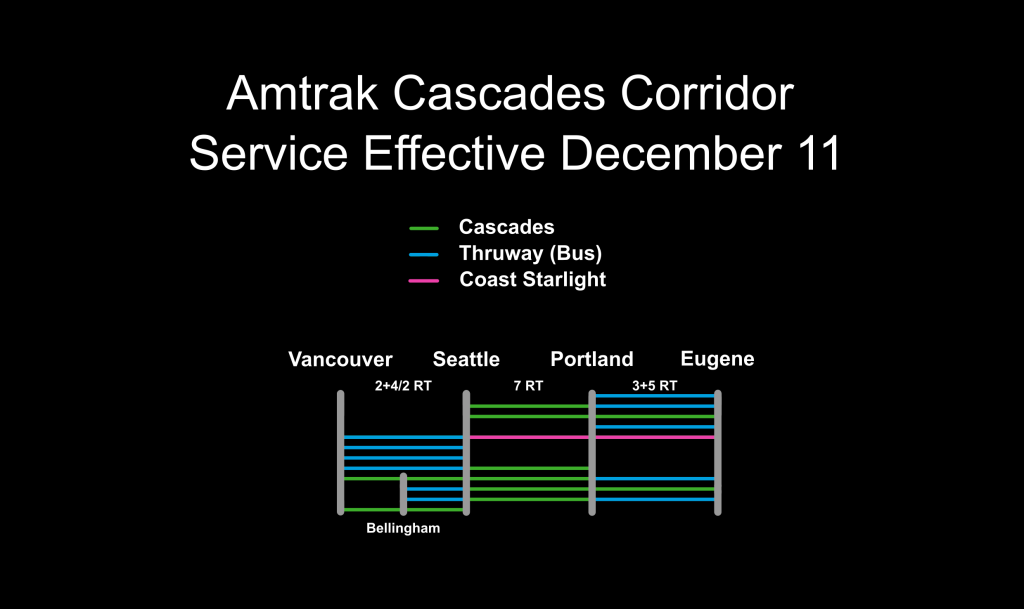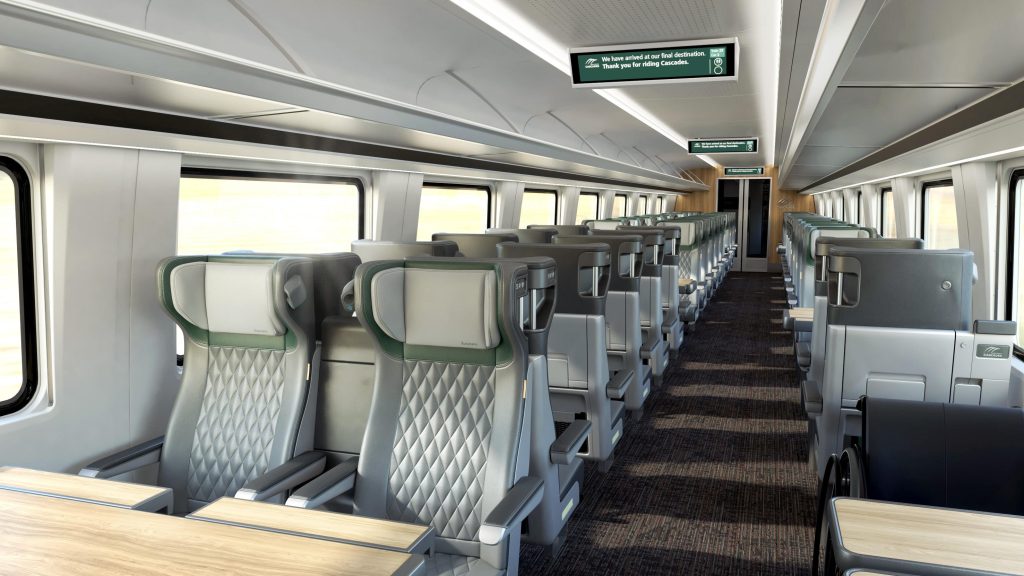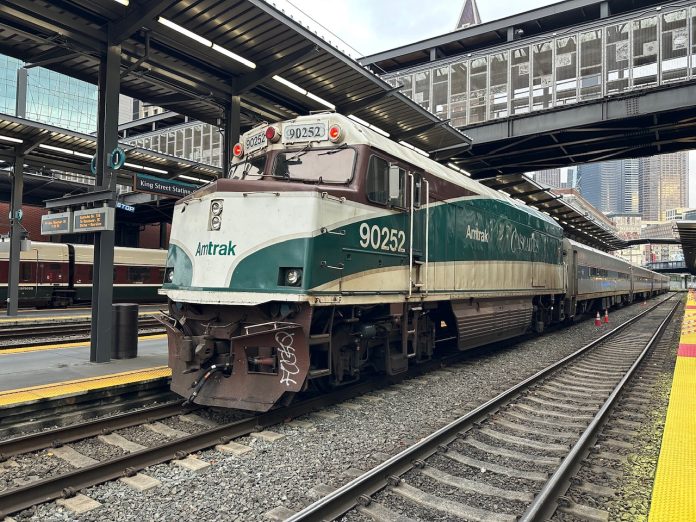Two new daily roundtrips on Amtrak Cascades between Seattle and Portland will start on Monday, December 11. The extra trips will help fill out the schedule with a mix of morning and evening trips, allowing for some earlier and later travel options. That will give riders more choices and offer a little more balance between departures than the current schedule.
The two extra daily trips will bring the total number of Cascades roundtrips on the Seattle-Portland segment to six, a 50% increase of service. With the daily Amtrak Coast Starlight long-distance service added into the mix, riders will actually be able to choose from seven trips in each direction, with the caveat that the Coast Starlight does not stop in Tukwila.
As a consequence of the fuller schedule, departure times are shifting all across the Cascades corridor, not just between Seattle and Portland. Span of service will also improve somewhat on the Seattle-Portland segment.

The earliest southbound departure from Seattle will be moved up from 7:22am to 5:52am while the earliest northbound departure from Portland shifts from 8:20am to 6:45am. The last southbound train from Seattle will be about an hour-and-a-half later than today at 7:50pm while the last northbound train from Portland will stay at 7:25pm.
| Train No. | SEA-PDX | Train No. | PDX-SEA |
|---|---|---|---|
| 503 | 5:52am | 500 | 6:45am |
| 505 | 7:08am | 502 | 8:20am |
| 11 | 9:50am | 504 | 10:40am |
| 517 | 12:10pm | 518 | 2:10pm |
| 507 | 2:20pm | 14 | 3:56pm |
| 509 | 5:40pm | 506 | 5:55pm |
| 511 | 7:50pm | 508 | 7:25pm |
Riders on the northern portion of the Cascades corridor will also see notable changes. The morning southbound trip from Vancouver, British Columbia will be bumped from 6:35am to 7:15am and the afternoon southbound trip will depart an hour earlier at 4:45pm. In the opposite direction, the morning northbound trip shifts from 7:50am to 8:30am and the afternoon northbound trip moves up an hour earlier at 6:00pm. That could make it a lot more difficult to justify taking the train for short day trips in both Seattle and Vancouver.
However, Amtrak has Thruway bus service between Seattle and Vancouver, British Columbia with four daily roundtrips. So that could be a good option for day-trippers or riders who want more flexibility in travel times. Another two daily Thruway roundtrips run between Seattle and Bellingham.
| Train No. | SEA-VAC | Train No. | VAC-SEA |
|---|---|---|---|
| 516 | 8:30am | 517 | 7:15am |
| 518 | 6:00pm | 519 | 4:45pm |
As for the Portland-Eugene segment, the first northbound trip from Eugene is shifting several hours later from 5:30am to 7:45am. That will allow for a mid-morning arrival in Portland but means continuing service arrives in Seattle mid-afternoon instead of midday. Other northbound and southbound journeys on the segment, however, will remain basically the same. Five daily Thruway roundtrips will also be retained.
| Train No. | PDX-EUG | Train No. | EUG-PDX |
|---|---|---|---|
| 505 | 11:08am | 504 | 7:45am |
| 11 | 2:22pm | 14 | 12:37pm |
| 507 | 6:09pm | 508 | 4:30pm |
The extra Seattle-Portland Cascades trips have been a long time coming. They were originally planned to launch in 2017 when the Point Defiance Bypass opened, but were never realized because the maiden voyage on the bypass ended in a fatal crash. Cascades service on the bypass remained suspended until late 2021.
The additional trips come on the heels of restored Cascades service between Seattle and Vancouver, British Columbia. Trains began operating with one daily roundtrip in September 2022 after a two-year hiatus because of the pandemic and staffing challenges. And the second daily roundtrip restarted in March.
Ridership on Cascades has been booming since the depths of the pandemic as service levels have been building back. More than 669,000 travelers rode trains in the past year, a 72% year-over-year increase. Ridership levels still have a ways to go to eclipse a pre-pandemic high of 852,269 riders in 2011, but most years during the last decade ridership had been hovering around 800,000 riders.
Cascades on-time performance, however, has continued to suffer and worsen. Just 47% of Washington-supported trains arrived on-time in 2022 with speed restrictions and freight train interference being primary culprits. That’s down significantly from pre-pandemic on-time performance when it was 58% in 2019 and 77% in 2013.

However, some rider experience improvements are headed to Cascades in the next few years. Amtrak, in partnership with the Washington State Department of Transportation (WSDOT), plans to launch new Airo trainsets in 2026. The new trains will be more modern, sleek, and comfortable than any Cascades equipment before. Coaches will offer amenities like panoramic windows, more table seating, USB ports and individual power outlets, and seatback tablet holders. And all trainsets will feature eight coaches in a two-class configuration (Coach and Business) with cafe car and baggage service.
In October, WSDOT previewed its draft service development plan for Cascades by charting several service growth alternatives. The draft plan outlines five service level options, ranging from eight to 16 daily roundtrips (not counting Coast Starlight) between Seattle and Portland. Some of the options are considered to be “building block” options as corridor improvements and slots are secured to add more trips over a 20-year period. Overall, the draft plan suggests that 16 daily roundtrips would be the sweet spot for ridership demand. A final plan should be published soon and help qualify Cascades for federal funding to improve service in the future.
For now, Cascades riders can start looking toward the new Seattle-Portland trips. Tickets will open for booking on Friday, December 1.
Stephen is a professional urban planner in Puget Sound with a passion for sustainable, livable, and diverse cities. He is especially interested in how policies, regulations, and programs can promote positive outcomes for communities. With stints in great cities like Bellingham and Cork, Stephen currently lives in Seattle. He primarily covers land use and transportation issues and has been with The Urbanist since 2014.



